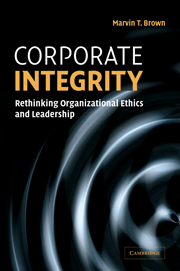Book contents
- Frontmatter
- Contents
- Preface
- 1 The context for corporate integrity
- 2 Cultural integrity as openness
- 3 Interpersonal integrity as relational wholeness
- 4 Organizational integrity as pursuing a worthwhile purpose
- 5 Social integrity as civic cooperation
- 6 Environmental integrity as natural prosperity
- 7 Corporate integrity and organizational leadership
- Appendix: Assessment worksheets
- Bibliography
- Index
3 - Interpersonal integrity as relational wholeness
Published online by Cambridge University Press: 05 September 2012
- Frontmatter
- Contents
- Preface
- 1 The context for corporate integrity
- 2 Cultural integrity as openness
- 3 Interpersonal integrity as relational wholeness
- 4 Organizational integrity as pursuing a worthwhile purpose
- 5 Social integrity as civic cooperation
- 6 Environmental integrity as natural prosperity
- 7 Corporate integrity and organizational leadership
- Appendix: Assessment worksheets
- Bibliography
- Index
Summary
The previous chapter presented a method for examining and changing communication patterns and examined the meaning of cultural integrity as openness to differences and disagreements. This chapter also performs two related functions. It demonstrates the significance of the book's focus on relationships and, at the same time, explores the interpersonal challenge of relational wholeness.
From a contextual model of communication, relationships among employees and between employees and employers are constituted through multiple verbal and nonverbal communication patterns. These patterns provide the context for addressing, or avoiding, a number of issues that affect the quality of the work community, such as health and pension benefits, job security, due process, occupational safety, fair wages, racism, gender differences, equal opportunity, balancing work and family obligations, privacy, monitoring, honesty, trust, conflicts of interest, and employee participation. Conversations about any of these issues rely on a number of ethical principles and standards of justice, which are sometimes included in corporate mission statements and codes of conduct. In other cases, those responding to these issues can bring ethical principles into the conversation. Whether any ethical analysis actually occurs, as well as what counts as ethically relevant, depends on the communication patterns that provide the expectations and limits of what should be discussed in specific situations. A conversation on due process, for example, would not even occur in a work setting dominated by the master-and-servant image of relationship. Its occurrence requires at least some notion of workers as having civic rights.
- Type
- Chapter
- Information
- Corporate IntegrityRethinking Organizational Ethics and Leadership, pp. 69 - 100Publisher: Cambridge University PressPrint publication year: 2005



